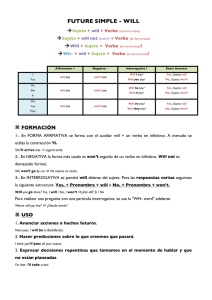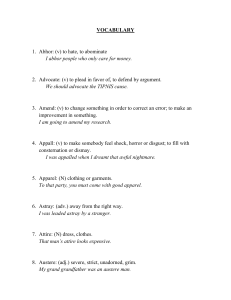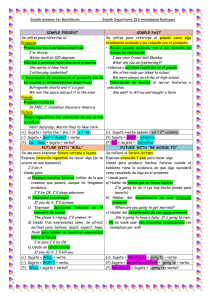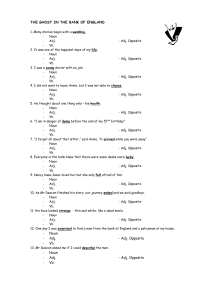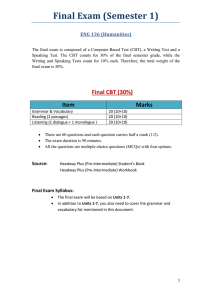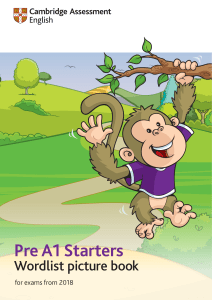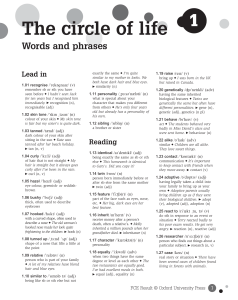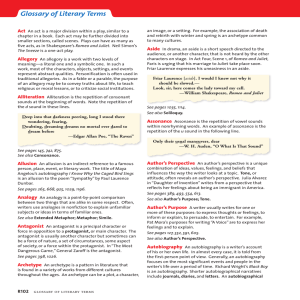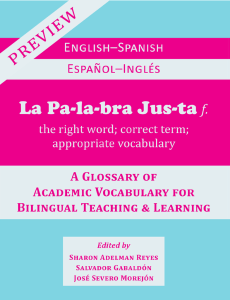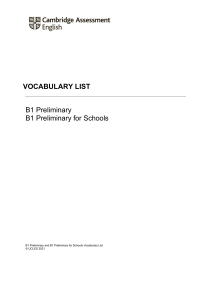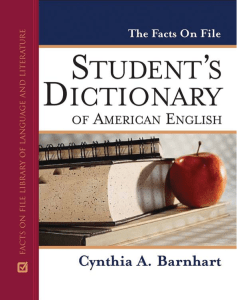INGLÉS 1ª EVALUACIÓN GRAMMAR 1. Simple and continuous forms
Anuncio
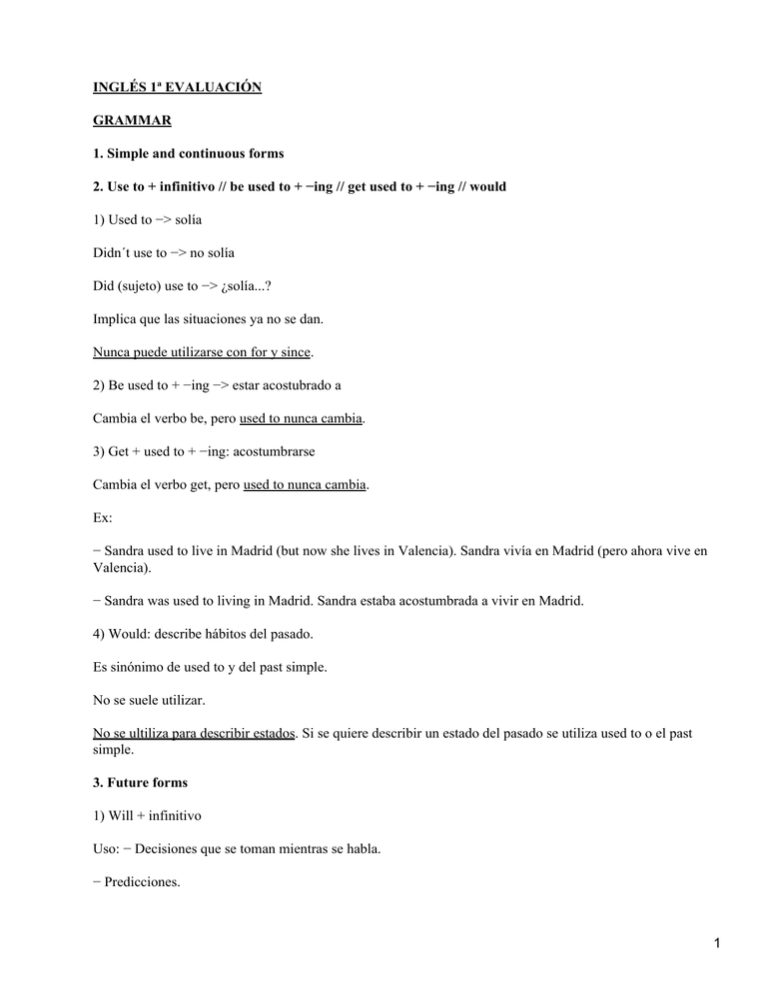
INGLÉS 1ª EVALUACIÓN GRAMMAR 1. Simple and continuous forms 2. Use to + infinitivo // be used to + −ing // get used to + −ing // would 1) Used to −> solía Didn´t use to −> no solía Did (sujeto) use to −> ¿solía...? Implica que las situaciones ya no se dan. Nunca puede utilizarse con for y since. 2) Be used to + −ing −> estar acostubrado a Cambia el verbo be, pero used to nunca cambia. 3) Get + used to + −ing: acostumbrarse Cambia el verbo get, pero used to nunca cambia. Ex: − Sandra used to live in Madrid (but now she lives in Valencia). Sandra vivía en Madrid (pero ahora vive en Valencia). − Sandra was used to living in Madrid. Sandra estaba acostumbrada a vivir en Madrid. 4) Would: describe hábitos del pasado. Es sinónimo de used to y del past simple. No se suele utilizar. No se ultiliza para describir estados. Si se quiere describir un estado del pasado se utiliza used to o el past simple. 3. Future forms 1) Will + infinitivo Uso: − Decisiones que se toman mientras se habla. − Predicciones. 1 En la 1ª persona se puede utilizar shall, pero no es frecuente. 2) Going to Uso: − Intenciones y planes. − Predicciones evidentes. 3) Present continuous Uso: − Planes a corto plazo (con preparativos, fecha, hora...) 4) Present simple Uso: − Hechos para los que se tiene una hora o una fecha. 5) Future continuous (will be + −ing // won´t be + −ing // will (sujeto) be + −ing) Uso: − Acciones futuras que se desarrollarán durante un periodo de tiempo, coincidiendo además con otra acción. Ex: We can´t come round at seven becouse we´ll be having dinner. − Acciones futuras que ya se hayan planificado. Ex: This time next week, I´ll be living in Estepona. 6) Future perfect (will have + −ed/3ªcol // won´t have + −ed/3ª col // Will (suj) have + −ed/3ªcol) Uso: − Cosas que se habrán completado en un momento determinado del futuro. Se suele utilizar by para especificar de qué momento futuro estamos hablando. Ex: By the time I´m 30, I´ll have travelled around the world. Will you have finished your studies by 2006? 7) Future time clauses After (después de) − as (cuando) − as sonn as (en cuanto) − before (antes de) − by the time (para cuando) − until (hasta que) − when (cuando) − while (mientras) Detrás de ellos no se pueden utilizar will, going to o present continuous. Se suele utilizar present simple o present perfect. Ex: I´m going to speak to the manager when we get there He´s taking his practical driving test as soon as he´s passed the theory 4. Reported speech 2 1) Reported statements: tense changes Present simple −−−−> past simple Present continuous −−−−> past continuous Past simple −−−−> Past perfect simple Present perfect simple −−−−> past perfect simple Will −−−−> would Can −−−−> could Must −−−−> had to 2) Reported statements: other changes − Los verbos modales (should, could, would, might, ought to,etc) no suelen cambiar. Ex: Jen might want to go −−> She said that Jen might want to go. − Los pronombres: I −−−−> she/he You (de ti/a ti) −−−−> me We −−−−> They Our −−−−> Their − Expresiones de tiempo y lugar: Here −−−−> there This −−−−> that These −−−−> those Now −−−−> then Next weed −−−−> the following weed Today −−−−> that day Tonight −−−−> that night Tomorrow −−−−> the following day/the next day Yesterday −−−−> the day before/the previous day 3 Last week −−−−> the week before / the previous week 3) Reporting verbs. − Verbos con complemento indirecto. Dar órdenes o hacer peticiones. Advise (aconsejar) Ask (pedir) Beg (rogar) Invite (invitar) Order (ordenar) Remind (recordar) Tell (decir) Warn (avisar) Ex: − Whatever you do, don´t tell your mum what happened! −−> He advised me not to tell my mum what had happened. − Please, don´t tell my mum! −−> He begged me not to tell his mum. − That + sujeto + verbo Admit (admitir) Agree (acordar) Announce (anunciar) Complain (quejarse) Declare (declarar) Explain (explicar) Insist (insistir) Predict (predecir) Promise (prometer) Recommend (recomendar) Reply (responder) 4 Reveal (revelar) Say (decir) Suggest (sugerir) Warn (avisar) En el registro formal that se puede opitir. Ex: I promise to write soon −−> She promised (that) she would write soon. You need to be optimistic in this profession −−> He explained (to her) (that) she needed to be optimistic in that profession. − Hay verbos que pueden ir acompañados de otro verbo + −ing, si el sujeto de ambos es el mismo. Suggest (sugerir) Recommend (recomendar) Apologize for (pedir disculpas por) Ex: She suggested meeting at 7 He apologized for forgetting. − Con suggest y recommend también se utiliza That + sujeto + should. Ex: He suggested that we should meet later. The doctor recommended that I should rest. −Verbos como agree (acodar, aceptar) y offer (ofrecer) van seguidos por un infinitivo con to. Ex: He agreed to come. She offered to help. 4) Reported commands and requests: El imperativo se utiliza para dar órdenes y hacer peticiones. En estilo indirecto: sujeto + verbo + cd + infinitivo (con to) Ex: Tell me the funniest joke you know −−−> She told him to tell her the funniest joke he knew. En negativo se coloca not delate de infinitivo (con to) Ex: Rember not to tell my mum. −−−> He reminded her not to tell his mother. 5) Reported questions: 5 verbo + sujeto −−> sujeto + verbo Ex: What´s your favourite comedy? she asked −−> She asked (me) what my favourite comedy was. Wh− questions −−> wh− question Ex: Why are you laughing? −−> He asked her why she was laughing. No wh− questions −−> se añade if / whether Ex: Are you feeling optimistic about the future? they asked us −−> they asked us if / whether we were feeling optimistic about the future. 5. Modal verbs − + infinitivo con to − No −s − No do/does − Tienen una única forma. 1) Ability and permission Can, could, be able to, be allowed to. (puedo) Be able to: habilidades. Be allowed to: pedir permiso. musn´t: prohibición firme. 2) Posibility and deducción May, might, can, could, must (puede que) can´t: algo imposible must / can´t: deducciones lógicas. (debe de) 3) Obligation and necessity Must, have to, need, should, ought to Must (have to) = obligación 6 Needn´t (don´t have to) = no obligación Ought to, should y shouldn´t = consejos = had better Had better / had better not. = amenazas también Have to = must but Don´t have to NO ES IGUAL A must´n. Don´t have to = no es necesario. Must´n = prohibido. 4) Perfect forms of modal verbs − Must have + −ed/3ªcol: certeza o conclusión lógica del pasado − Can´t have + −ed/3ªcol: imposible que sucediera en el pasado − Might/may/could have + −ed/3ªcol: posibilidad en el pasado − Could have + −ed/3ªcol: podía haber sucedido, pero ahora es imposible que suceda − Should have + −ed/3ªcol: opinar aunque ahora ya no pueda cambiar − Shouldn´t have + −ed/3ªcol: arrepentimiento o crítica a cosas pasadas Adjetivo comparativo 1._SUPERIORIDAD = adj cortos (1sílaba/2en −y): −er than adj largos(2,3 o 4 silabas):more + adj +than 2._INFERIORIDAD = less + adj +than 3._IGUALDAD = as + adj + as Adjetivo superlativo Adj cortos : the −est Adj largos : the most + adj 1) Too + adj / adv = demasiado 2) (not) + adj / adv /sust + enough = (no) suficiente Conditionals If: si Unlees: a no ser que Even if: incluso si As long as: mientras 7 Providing that: con tal que 0.− Se acepta como cierto/da órdenes = If + present simple...,present simple/imperativo. If you have a strong compaign, the public listens 1._Real/promesas o advertencias = If + present simple..., will + infinitive If it rains, I will take the umbrella 2._Probable pero difícil = If + pasado simple..., would + infinitive If I wan the lottery, I would buy a house 3._Imposible = If + past perfect (had+−ed/3ªcol)..., would have+ part If I had lived in Italy, I would have spoken a perfect Italian Wish + past / past perfect / would 1._ Wish + past simple/continuous = se desea que un hecho o situación presente sea diferente. 2._ Wish + would = quejas 3._ Wish / if only + past perfect simple/continuos/could have + past pasado 8
